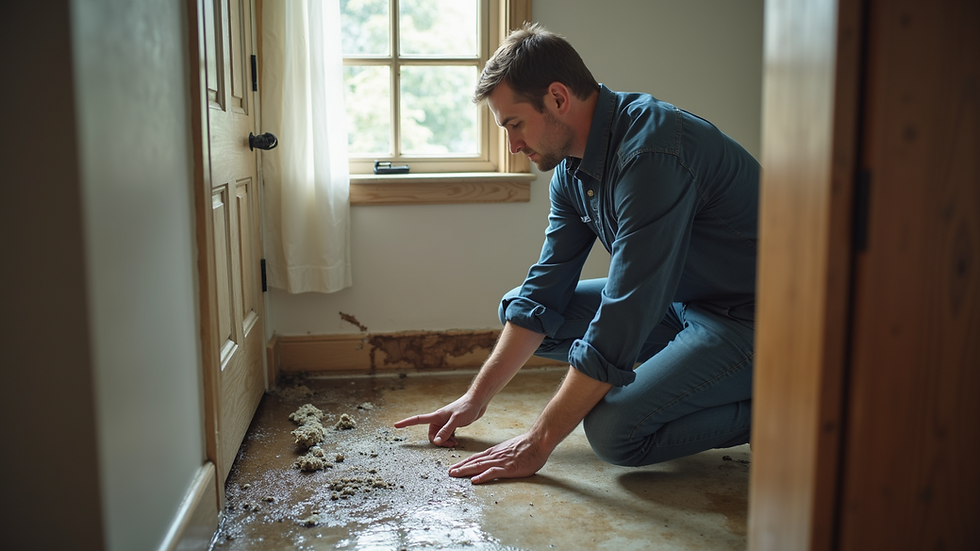Mitigating Water Damage: A Comprehensive Guide
- dominic0213
- Oct 7, 2025
- 4 min read
Water damage can strike unexpectedly, causing significant disruption and costly repairs. Taking prompt and effective action is essential to minimize the impact and restore your property to its original condition. In this guide, I will walk you through practical steps and expert advice to help you mitigate water damage efficiently. Whether you are dealing with a minor leak or a major flood, understanding the right approach can save you time, money, and stress.
Understanding the Importance of Mitigating Water Damage
Water damage is more than just a nuisance; it can compromise the structural integrity of your home and create health hazards. When water infiltrates walls, floors, or ceilings, it can lead to mold growth, wood rot, and electrical issues. The longer water remains, the more severe the damage becomes.
To mitigate water damage effectively, you must act quickly and decisively. Start by identifying the source of the water and stopping it if possible. This might mean shutting off the main water supply or fixing a leaking pipe. Next, remove standing water using pumps, wet vacuums, or mops. Dry the affected areas thoroughly with fans and dehumidifiers to prevent mold.
Regular maintenance can also reduce the risk of water damage. Inspect your roof, gutters, and plumbing systems routinely. Clear debris from gutters to ensure proper drainage. Seal cracks in your foundation and walls to prevent water seepage. These preventive measures are crucial in protecting your property from future incidents.

Practical Steps for Mitigating Water Damage
Mitigating water damage requires a systematic approach. Here are the key steps to follow:
Ensure Safety First
Before entering a water-damaged area, turn off electricity to avoid electrocution. Wear protective gear such as gloves and boots.
Stop the Water Source
Locate and stop the source of water. This could be a burst pipe, roof leak, or appliance malfunction.
Remove Standing Water
Use pumps or wet vacuums to extract water. For smaller amounts, mops and towels can be effective.
Dry and Dehumidify
Use fans, heaters, and dehumidifiers to dry the area completely. Open windows if weather permits to increase ventilation.
Clean and Disinfect
Clean all surfaces with appropriate disinfectants to prevent mold and bacteria growth.
Inspect for Damage
Check walls, floors, and furniture for signs of damage. Remove and replace materials that are beyond repair.
Document the Damage
Take photos and notes for insurance claims and restoration services.
Following these steps promptly can significantly reduce the extent of damage and the cost of repairs.

Will Insurance Fix Water Damage?
Insurance coverage for water damage varies widely depending on your policy and the cause of the damage. Typically, homeowner’s insurance covers sudden and accidental water damage, such as a burst pipe or an appliance failure. However, damage caused by flooding, poor maintenance, or gradual leaks may not be covered.
It is important to review your insurance policy carefully and understand what types of water damage are included. If you experience water damage, contact your insurance company immediately to report the incident. Document all damage thoroughly with photos and receipts for repairs.
In some cases, insurance adjusters will require professional assessments to determine the extent of damage and necessary repairs. This is where expert water damage restoration services come into play. They provide detailed reports and professional cleanup, which can support your insurance claim and ensure your property is restored properly.

Choosing the Right Water Damage Restoration Service
Selecting a reliable restoration service is critical to effective water damage mitigation. Look for companies with experience, proper certifications, and positive customer reviews. A professional service will have the equipment and expertise to handle water extraction, drying, cleaning, and repairs.
When contacting a restoration company, ask about their response time, process, and guarantees. Emergency services are often necessary to prevent further damage. A reputable company will also coordinate with your insurance provider to streamline the claims process.
In Austin and surrounding areas, CDG Construction stands out as a trusted provider. They offer comprehensive construction, remodeling, and emergency restoration services, managing every aspect of the project from start to finish. Their expertise ensures your property is restored efficiently and to the highest standards.
Preventing Future Water Damage
Mitigation does not end with cleanup and repairs. Preventing future water damage is equally important. Here are some practical tips:
Maintain Your Roof and Gutters
Inspect your roof for missing shingles or damage. Clean gutters regularly to prevent water overflow.
Install Proper Drainage Systems
Ensure your property has adequate drainage to direct water away from the foundation.
Seal Windows and Doors
Use weatherstripping and caulking to prevent water intrusion during storms.
Monitor Plumbing Systems
Check pipes and appliances for leaks. Replace old or damaged components promptly.
Use Water Alarms
Install water leak detectors near appliances and in basements to get early warnings.
Landscape Wisely
Grade your yard to slope away from your home, reducing the risk of water pooling near the foundation.
By implementing these measures, you can protect your property and reduce the likelihood of costly water damage in the future.
Taking Control of Water Damage Situations
Water damage can feel overwhelming, but with the right knowledge and resources, you can take control of the situation. Acting quickly, following a clear plan, and seeking professional help when needed are the best ways to safeguard your property.
Remember, mitigation is not just about fixing the immediate problem. It is about protecting your investment and ensuring your home remains safe and comfortable. If you ever face water damage, do not hesitate to reach out to experts who specialize in water damage restoration. Their experience and equipment can make all the difference in restoring your property efficiently.
By staying vigilant and prepared, you can minimize the impact of water damage and maintain the value and safety of your home for years to come.







Comments